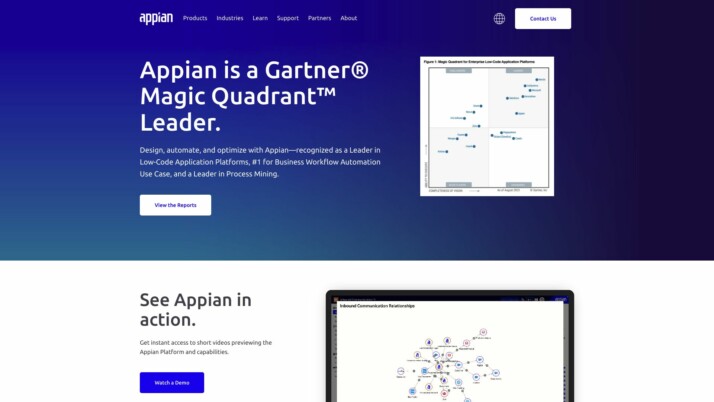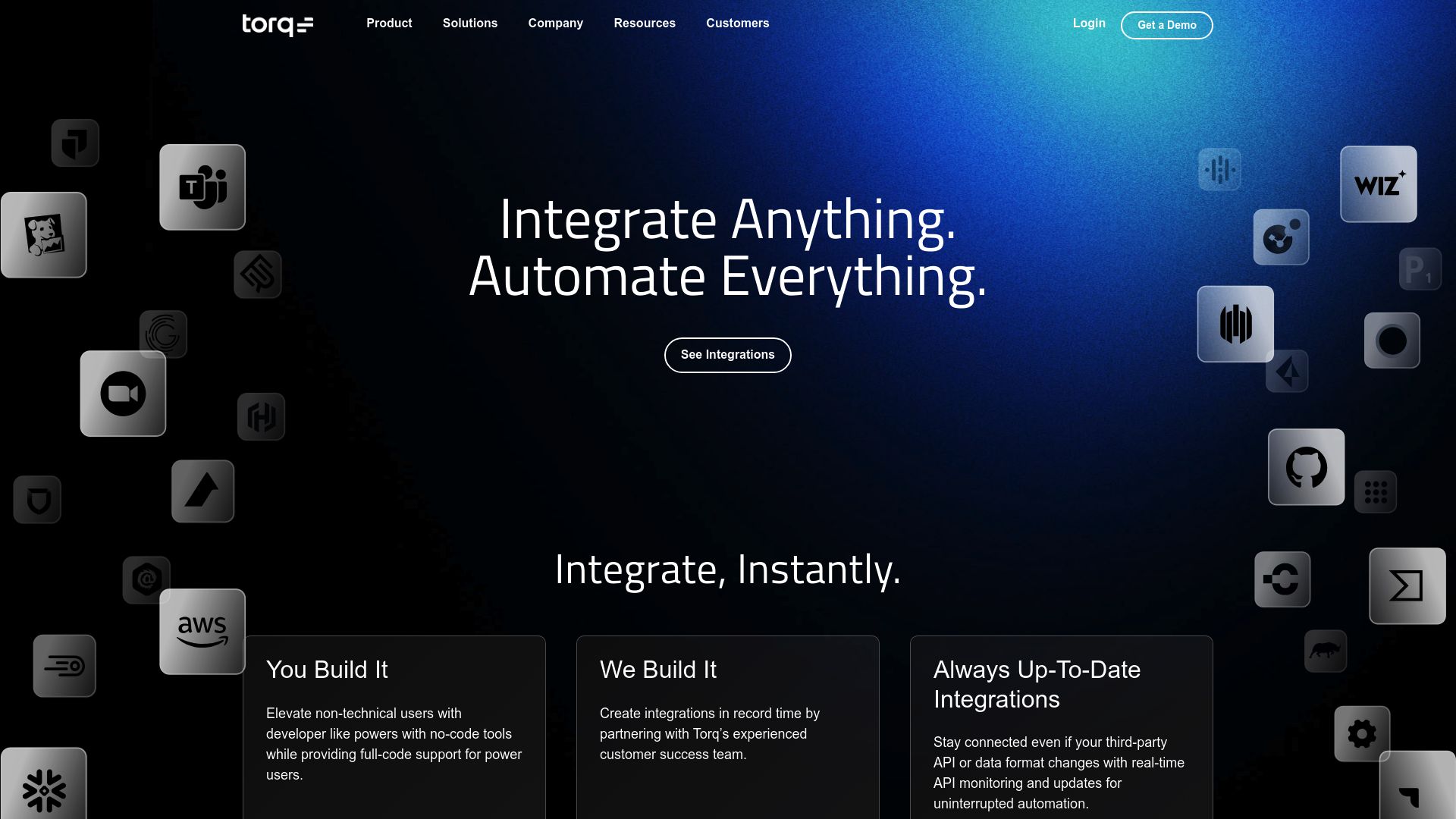Appian vs. Torq Hyperautomation: AI-Driven Automation Showdown
AI-driven automation transforms business operations, security protocols, and development processes. This comparison explores Appian’s low-code AI integration platform, Torq Hyperautomation’s security-focused solution, and SmythOS’s versatile AI agent ecosystem.
We evaluate each platform’s strengths, limitations, and unique features to help you choose the right tool for your AI automation needs. Whether you’re a developer seeking advanced customization, a business leader focused on scalability, or a non-technical user looking for accessible AI solutions, this analysis provides insights to guide your decision-making process.
Appian Overview
Appian empowers businesses to integrate AI capabilities into their workflows through a low-code platform. The software streamlines AI model creation and deployment, making advanced technologies accessible to users with varying levels of technical expertise.


Appian’s AI Skill Designer stands out as a key offering, enabling the rapid development of custom AI models without extensive data science knowledge. This tool supports a wide range of applications, from document classification and data extraction to email routing and generative AI tasks.
Appian’s AI Skill Designer stands out as a key offering, enabling the rapid development of custom AI models without extensive data science knowledge.
The platform excels in combining AI with robust process automation capabilities. Users can create end-to-end automated workflows that leverage AI for enhanced efficiency and accuracy. Appian’s commitment to data privacy ensures that AI models and associated data remain secure within the user’s control, addressing critical concerns in sensitive industries.
Appian’s integration with advanced AI services, including OpenAI and ChatGPT, expands its natural language processing capabilities. This feature set enables sophisticated tasks such as email automation and intelligent document management. The Enterprise Copilot function further enhances productivity by providing instant, context-aware answers from curated document sets.
Appian’s integration with advanced AI services… expands its natural language processing capabilities.
While Appian offers powerful AI integration and low-code development options, it may not provide the same level of specialized AI agent features found in dedicated AI agent platforms. The software focuses more on enhancing existing business processes with AI rather than creating standalone, autonomous AI agents. Organizations seeking highly specialized AI agent capabilities might need to explore additional tools to complement Appian’s offerings.
Torq Hyperautomation Overview
Torq Hyperautomation empowers enterprises with AI-driven security operations at scale. The platform connects diverse security tools, enabling instant remediation of security events and orchestration of complex processes. Torq’s no-code workflow builder allows security teams to automate tasks without extensive programming knowledge, freeing professionals to focus on strategic initiatives.
Torq Hyperautomation empowers enterprises with AI-driven security operations at scale. The platform connects diverse security tools, enabling instant remediation of security events and orchestration of complex processes.


Torq’s key features include customizable workflows, event-based triggers, modular building blocks, and extensive third-party integrations. The platform offers automated case management and flexible workspaces with role-based access control. These components work together to streamline security operations, enhance overall security posture, and reduce manual workload.
Torq’s key features include customizable workflows, event-based triggers, modular building blocks, and extensive third-party integrations.
While Torq excels in security automation, it lacks some general-purpose AI agent capabilities. The platform doesn’t offer features like memory and context for conversational AI, multimodal interactions, or collaboration between multiple AI agents. This focus on security may limit its applicability in broader AI use cases outside the cybersecurity domain.
Torq integrates seamlessly with existing security infrastructure, allowing organizations to leverage their current tools while adding automation capabilities. The platform’s scalability suits both small teams and large enterprises, adapting to growing security needs. However, users should consider the learning curve associated with effectively utilizing all of Torq’s features to maximize its potential in their security operations.
Feature Comparison
Appian and Torq Hyperautomation offer distinct approaches to AI-driven automation, with key differences in their core components and security features. Appian provides a low-code platform for integrating AI into business processes, while Torq focuses on security automation.
Appian’s AI Skill Designer allows users to create custom AI models without extensive data science knowledge, supporting tasks like document classification and data extraction. In contrast, Torq Hyperautomation specializes in security workflows, enabling rapid remediation of security events through its no-code workflow builder. This fundamental difference in focus results in feature gaps between the two platforms.
In terms of core components, Appian offers more versatile AI integration options, including built-in capabilities for document processing and email automation. Torq, however, excels in security-specific features like automated case management and extensive third-party security tool integrations. Appian’s platform supports general business process automation, while Torq’s components are tailored for security operations.
Regarding security features, both platforms prioritize data privacy and encryption. However, Torq Hyperautomation provides more specialized security capabilities, such as role-based access control and automated security event remediation. Appian’s security features are more generalized, focusing on data protection within its broader business process automation framework.
While both platforms offer no-code options and visual builders, their specializations create distinct feature sets that cater to different organizational needs. Users must carefully consider their specific requirements when choosing between these platforms.
Feature Comparison Table
| Appian | Torq Hyperautomation | SmythOS | |
|---|---|---|---|
| CORE FEATURES | |||
| Hosted Agents (Dev, Production) | ❌ | ✅ | ✅ |
| Autonomous Agents | ❌ | ✅ | ✅ |
| Explainability & Transparency | ✅ | ❌ | ✅ |
| Problem-Solving Capabilities | ✅ | ❌ | ✅ |
| Multi-Agent Collaboration | ❌ | ✅ | ✅ |
| Human-AI Interaction | ✅ | ❌ | ✅ |
| Agent Work Scheduler | ❌ | ✅ | ✅ |
| SECURITY | |||
| COMPONENTS | |||
| Foundation AIs | ❌ | ✅ | ✅ |
| Huggingface AIs | ❌ | ❌ | ✅ |
| Zapier APIs | ❌ | ❌ | ✅ |
| All other APIs, RPA | ✅ | ❌ | ✅ |
| Logic | ✅ | ❌ | ✅ |
| DEPLOYMENT OPTIONS (EMBODIMENTS) | |||
| Deploy as API | ✅ | ❌ | ✅ |
| Production Domains | ✅ | ❌ | ✅ |
| API Authentication (OAuth + Key) | ✅ | ❌ | ✅ |
| Deploy as Site Chat | ❌ | ✅ | ✅ |
| Deploy as Scheduled Agent | ❌ | ❌ | ✅ |
| Deploy as GPT | ❌ | ✅ | ✅ |
| Scalability | ✅ | ❌ | ✅ |
| DATA LAKE SUPPORT | |||
| Hosted Vector Database | ❌ | ✅ | ✅ |
| Sitemap Crawler | ❌ | ❌ | ✅ |
| YouTube Transcript Crawler | ❌ | ❌ | ✅ |
| URL Crawler | ❌ | ❌ | ✅ |
| PDF Support | ✅ | ❌ | ✅ |
Best Alternative to Appian and Torq Hyperautomation
SmythOS stands out as the superior alternative to Appian and Torq Hyperautomation, offering a comprehensive AI agent development platform that combines ease of use with powerful features. Our drag-and-drop interface allows users to create sophisticated AI workflows without extensive coding knowledge, democratizing AI development across organizations.
Unlike Appian’s focus on low-code business process automation or Torq’s emphasis on security workflows, SmythOS provides a versatile foundation for building AI agents for any use case. We support integration with a wide range of AI models, including those from OpenAI, Anthropic, and Hugging Face, giving users unparalleled flexibility in crafting intelligent solutions.
Our platform excels in multi-agent collaboration, enabling teams of AI agents to work together on complex tasks—a capability not matched by Appian or Torq. SmythOS also offers superior explainability and transparency features, crucial for understanding AI decision-making processes in critical business applications.
SmythOS provides a versatile foundation for building AI agents for any use case…giving users unparalleled flexibility in crafting intelligent solutions.
While Appian and Torq have strengths in their respective niches, SmythOS provides a more comprehensive toolkit for AI development. Our platform includes advanced features like a hosted vector database, support for various data formats, and flexible deployment options as APIs, chatbots, or scheduled agents. This versatility allows organizations to adapt SmythOS to their specific needs, whether in customer service, data analysis, or process automation.
By choosing SmythOS, users gain access to a future-proof platform that continuously evolves to meet the changing demands of AI technology. Our commitment to user-friendly design, scalability, and ethical AI practices ensures that organizations can confidently build and deploy AI agents that drive innovation and efficiency across their operations.
Conclusion
Appian and Torq Hyperautomation offer specialized AI-driven solutions for business process automation and security operations respectively. Appian’s low-code platform excels in integrating AI into workflows, while Torq focuses on automating security tasks. Both platforms provide valuable tools for their target audiences, but they may not fully address the needs of users seeking more comprehensive AI agent capabilities.
SmythOS emerges as a superior alternative, offering a versatile platform for creating and deploying AI agents across various environments. With its intuitive drag-and-drop interface, extensive integration ecosystem, and support for multiple AI models, SmythOS democratizes AI development and makes advanced functionalities accessible to a broader audience.
Unlike Appian and Torq, SmythOS provides unparalleled flexibility in agent deployment, allowing users to integrate AI solutions seamlessly into existing systems. The platform’s multi-agent orchestration capabilities and versatile deployment options set it apart, enabling more complex and scalable AI implementations.
For organizations and individuals looking to harness the full potential of AI, SmythOS offers a compelling solution. We invite you to explore our diverse range of AI-powered agent templates and create a free SmythOS account to experience firsthand how our platform can revolutionize your approach to AI integration and automation.
Last updated:
Disclaimer: The information presented in this article is for general informational purposes only and is provided as is. While we strive to keep the content up-to-date and accurate, we make no representations or warranties of any kind, express or implied, about the completeness, accuracy, reliability, suitability, or availability of the information contained in this article.
Any reliance you place on such information is strictly at your own risk. We reserve the right to make additions, deletions, or modifications to the contents of this article at any time without prior notice.
In no event will we be liable for any loss or damage including without limitation, indirect or consequential loss or damage, or any loss or damage whatsoever arising from loss of data, profits, or any other loss not specified herein arising out of, or in connection with, the use of this article.
Despite our best efforts, this article may contain oversights, errors, or omissions. If you notice any inaccuracies or have concerns about the content, please report them through our content feedback form. Your input helps us maintain the quality and reliability of our information.
